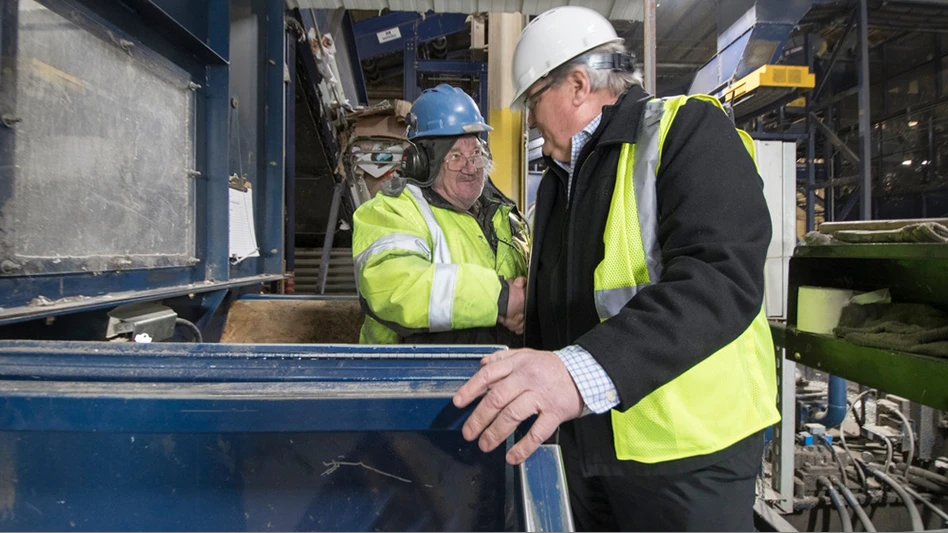
Sweden has a rather unusual problem: The country is running short of waste to fuel its 32 waste-to-energy plants. With a record high recycling rate, decreasing waste generation and expansion of its WTE capacity, Sweden imports waste to fuel its WTE capacity to its fullest. What we in the U.S. might consider a problem, Sweden sees as an opportunity. How can that be?
A world leader in solid waste management, Sweden landfills only 1 percent of its municipal solid waste (MSW), recycles approximately 50 percent and thermally processes 49 percent for heat and power generation in WTE plants. In 2011, Sweden’s plants imported 813,000 tons of waste from Norway.
Sweden’s leaders began leading the nation away from landfilling toward robust recycling and thermal processing beginning in 1904, when the first Swedish WTE plant was built. In the late 1940s, with the expansion of district heating systems, more WTE plants were constructed. Oil shocks in the 1970s led Sweden’s leaders to develop an energy strategy independent of oil.
In the 1980s, Sweden began to introduce renewable, environmentally friendly energy sources, such as biofuels and waste, which then generated about 10 percent of Sweden’s total electricity. During the first decade of this century, WTE in Sweden rapidly expanded, processing 39 percent of the nation’s MSW in 1999 and 49 percent in 2010.
Around 5.3 million tons of household and industrial waste were processed in Sweden’s WTE plants in 2011. That same year 15.5 gigawatt hours (GWh) of energy were produced, the highest international energy recovery rate from waste, of which 13.5 GWh were used for heating, and 2 GWh for electricity, corresponding to 15 percent of Sweden’s district heating needs and 2.45 percent of the country’s electricity needs.
What factors have contributed to Sweden’s significant reliance on WTE? One of the most important is high landfill fees, which include Sweden’s landfill tax. In 2011, Sweden’s average landfilling charge was equivalent to roughly $193 per ton ($126 landfill fee and $67 landfilling tax), compared with the average U.S. landfill fee of $44 per ton. Land disposal in Sweden is the most expensive option compared with the 2011 average tipping fee of $84 per ton at Swedish WTE, composting and anaerobic digestion plants.
The second factor is the nation’s extensive network for district heating that contributes to the high energy recovery at WTE plants. Sweden’s high price for electricity is a third driver. The price of electricity in Sweden was around 30 cents per kilowatt hour (kWh) in the first quarter of 2012, three times higher than the 10 cents per kWh in the U.S. Electricity produced at Swedish WTE plants is the least expensive power option, because, unlike the United States, Sweden does not have cheaper local energy sources.
Also important are Sweden’s national policies supporting WTE, which include a carbon tax and participation in the European Union’s Emissions Trading Scheme. In addition, renewable portfolio standards and tax credits make WTE an economical option for electricity production. Finally, there’s public recognition that WTE is an environmentally safe, renewable energy source.
What will it take for the U.S. to assert a leadership role in waste management and energy recovery? Bottom line: It’s up to our state and federal officials to implement policies that support WTE, with input from industry and the public. Sweden’s model is instructive.
Harvey Gershman, hgershman@gbbinc.com, is president of Gershman, Brickner & Bratton Inc., solid waste management consultants.
Latest from Waste Today
- Techbros launches AI-integrated electronics processing facility
- Understanding interchange optimization
- Account Updater: Keeping customer credit cards always up-to-date
- Understanding credit card fees
- CDRA names new executive director
- CRI credits DRS modifications for Connecticut container recycling rate boost
- LRS expands into Indianapolis with purchase of GHW
- Pelleting equipment: Transform hard-to-handle waste streams





